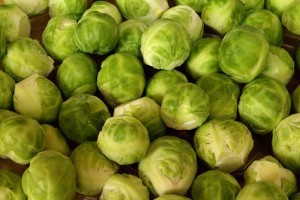You either love them or you hate them!
 Brussel sprouts are so nutritious that we shouldn’t save them for one day a year.
Brussel sprouts are so nutritious that we shouldn’t save them for one day a year.
- Brussel sprouts are very Low GL, which means that we can eat them in large quantities and not worry about weight gain
- They are high in fibre and good for our digestive system, and are great for lowering cholesterol.
- Brussel sprouts are an excellent source of vitamin C; 100 g sprouts provide about 85 mg of Vitamin C. Together with other antioxidant vitamins such as vitamin A and E, it helps protect the body by trapping harmful free radicals and strengthens our immune system
- Brussel sprouts are a good source of vitamin A, providing about 754 IU per 100g. Vitamin A is important for maintaining healthy mucus membranes and skin, and is essential for eye health.
- They are also rich in Vitamin K which is important for bone health and blood clotting, and reduces neuronal damage in the brain, reducing the risk of Alzheimer’s disease.
- They contain an abundance of phyto nutrients ( thiocyanates, indoles, lutein, zea-xanthin, sulforaphane and isothiocyanates) which are anti-oxidants and protect us against prostate, colon and endometrial cancers.
- They also contain di-indolyl-methane (DIM), a metabolite of indole-3-carbinol, which is great for hormone balance and supporting the immune system
- Lutein and zea-xanthin, which Brussel sprouts contain in high amounts are especially important for eye health helping to prevent retinal damage and “age-related macular degeneration related macular degeneration disease” (ARMD)
- They also contain good levels of B vitamins (important for energy production) and essential minerals such as copper, calcium, iron and potassium
But be careful how you cook them. Over cooking them will rid them of many of their nutritional benefits. It’s much beter to steam them and retain a little of their crunch.
Do you like Brussel sprouts, but they don’t seem to like you?? Some people find that they produce a lot of gas after eating Brussel sprouts. This is due to them containing a specific fibre called raffinose, which we, as humans can’t break down in the small intestine, so it is digested in the large intestine by bacteria which create a lot of gas. If this really bothers you, you can try taking a digestive enzyme which contains alpha-galactosidase which breaks down the raffinose before it reaches the large intestine, thus freeing you from the discomfort and potential embarrasment of wind.



